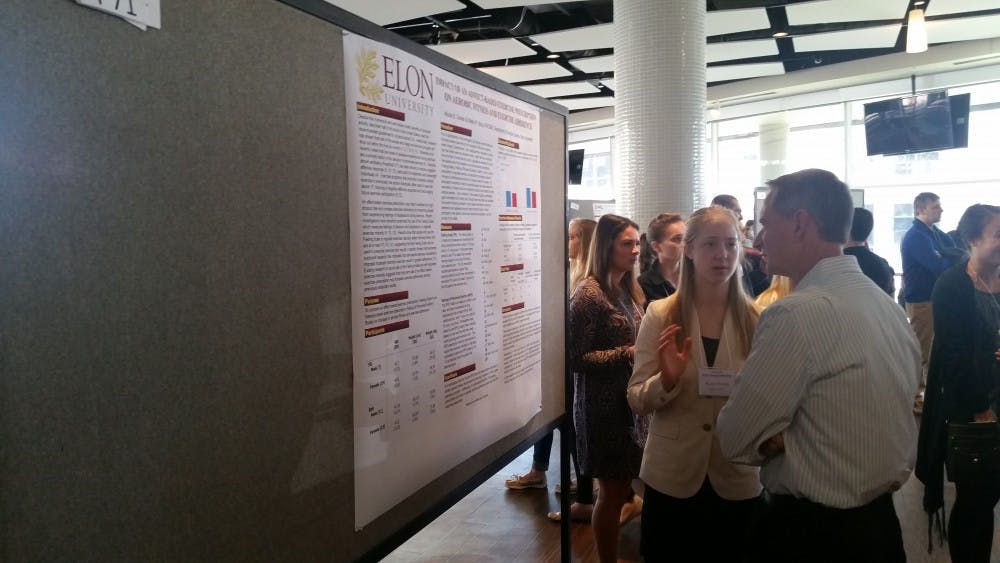After spending hours each day working out and bettering her own body, junior Nicole Doolen found a way to combine her passion for exercise science with her academic work by conducting research on affect based exercise on exercise adherence.
The beginning steps of this extensive research involved finding ways to motivate people to keep engaging in an exercise routine on a long-term basis. Associate Professor of Exercise Science Wally Bixby has previous research experience in exercise routines and has become Doolen’s
research mentor.
“For the last few years, exercise has been a passion of mine,” Doolen said. “It was great to be able to find a way of combining my personal passions with my intellectual journey. It’s been really great getting to apply something that is part of my personal life and look at it from a more academic and scholarly standpoint.”
In Doolen’s research, the participants, who are mainly Elon University faculty and staff members, are separated into two different groups: the people who will exercise and focus on how they feel as they are exercising, and the people who will exercise at different levels of intensity.
“Essentially, I’m looking at the effects of having people focus on how they feel during exercise rather than just how hard they are working,” Doolen said. “Typical exercise prescriptions have people exercise at a certain intensity level, but often times, especially for people who were previously sedentary, this results in feelings of displeasure during exercise which discourages them from participating in exercise in the future.”
While conducting these tests, Doolen met with her participants during the first, third and sixth month of research, measuring their level of fitness each time. Additionally, she gave them a Fitbit for a week so she could see how many steps they walked and how much exercise they completed.
One of the biggest indicators in the study is the change in aerobic fitness, found by having the participants record any exercise they do.
“We’ll be looking at the total number of minutes of exercise they do within that week and just comparing between the people that are focusing on how they feel during exercise — the affect-based exercise prescription — and the people that are focusing on how hard they are working during exercise — the intensity-based exercise prescription,” Doolen said.
Doolen began conducting research this past summer, when she had a six-week exercise intervention with faculty and staff. But she still does not have all the necessary information to finalize her research.
“I’m still in the process of my research,” she said. “I actually ended up doing a second round of exercising intervention during the fall because we wanted to get more participants to help get more data, and then we are following up with all participants over the next six months, so it is sort of a longer-term project.”
A major challenge that Doolen faced while conducting her research was people dropping out, altering the data. Participants have left the research project for a number of different reasons — some don’t have enough time, others are injured and a few have moved away from Elon.
But Doolen decided to give this challenge a positive twist.
“We have had quite a few people drop out, but that has been interesting too because that’s a lot of what my project is about — getting people to continue to exercise long-term,” she said. “But obviously, people are always going to drop out from an exercise program, so it has really been interesting looking at who is dropping out and why they are dropping out.”
Looking forward, Doolen plans to use the skills and knowledge from this project for physical therapy school or graduate school. She also wants to create a similar but smaller-scale project with her current research.
“For me, exercise and rehabilitation is really just about helping people to find ways to help themselves and giving people the tools they need to be successful to be healthy, and I think this research will really provide me with knowledge to do that,” Doolen said.


